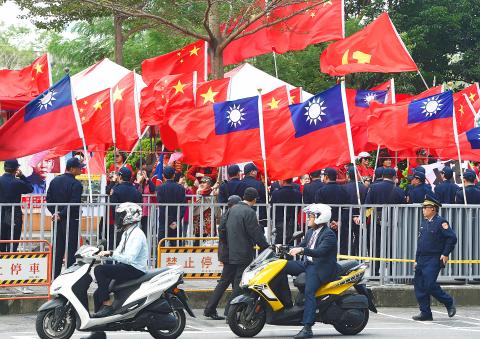Following a day of silence, the Chinese Nationalist Party (KMT) yesterday issued a statement challenging Chinese President Xi Jinping’s (習近平) definition of the so-called “1992 consensus,” saying that the “one country, two systems” framework is not part of the consensus.
“Xi’s remarks about a Taiwan version of the ‘one country, two systems’ model is not part of the content espoused by the ‘1992 consensus.’ Given that both sides of the Taiwan Strait are governed by separate governments, the ‘one country, two systems’ model unfortunately would not receive the support of the majority of Taiwanese,” the statement said.
Reiterating its definition of the “1992 consensus,” the KMT said that it was reached by the Straits Exchange Foundation and the Association for Relations Across the Taiwan Straits after they were authorized in November 1992 to engage in negotiations on the matter.

Photo: Liao Chen-huei, Taipei Times
In essence, the “1992 consensus” means that both sides of the Taiwan Strait adhere to the “one China” principle, but are allowed to have their own interpretations of what “China” means, it said.
“The ‘1992 consensus’ not only reflects the nature of cross-strait relations, which is seeking common ground while respecting differences, but also underlines the objective reality [of the ties] and conforms to both sides’ regulations,” the KMT said.
The statement came after Xi on Wednesday included “national unification” as part of his definition of the “1992 consensus” in a speech in Beijing to mark the 40th anniversary of the 1979 “Message to Compatriots in Taiwan,” which called for the unification of “China,” an end to military confrontation across the Taiwan Strait and expanded cross-strait interactions.
Xi also announced a plan to explore a Taiwan version of the “one country, two systems” model to achieve his goal of peaceful unification.
The Chinese leader’s definition of the “1992 consensus” stands in stark contrast to that provided over the years by the KMT, which has maintained that it allows room for Taiwan to interpret “China” as being the Republic of China (ROC).
The KMT’s Mainland Affairs Department on Wednesday held a meeting to discuss Xi’s speech, KMT Culture and Communications Committee acting director-general Tang Te-ming (唐德明) said.
In its statement, the KMT also reiterated its “unwavering opposition” to Taiwanese independence, saying that the ROC is already an independent sovereign state according to its Constitution.
“Cross-strait interactions and development must continue to move forward peacefully, because it is the hope of the public that both sides can expand and deepen their exchanges,” the KMT said, adding that the party, its caucus and local government leaders all look forward to making concerted efforts to ensure the peaceful development of cross-strait relations and a win-win situation for both sides.

Tropical Storm Gaemi strengthened into a typhoon at 2pm yesterday, and could make landfall in Yilan County tomorrow, the Central Weather Administration (CWA) said yesterday. The agency was scheduled to issue a sea warning at 11:30pm yesterday, and could issue a land warning later today. Gaemi was moving north-northwest at 4kph, carrying maximum sustained winds near its center of up to 118.8kph and gusts of 154.8kph. The circumference is forecast to reach eastern Taiwan tomorrow morning, with the center making landfall in Yilan County later that night before departing from the north coast, CWA weather forecaster Kuan Shin-ping (官欣平) said yesterday. Uncertainty remains and

SEA WARNING LIKELY: The storm, named Gaemi, could become a moderate typhoon on Wednesday or Thursday, with the Taipei City Government preparing for flooding A tropical depression east of the Philippines developed into a tropical storm named Gaemi at 2pm yesterday, and was moving toward eastern Taiwan, the Central Weather Administration (CWA) said. Gaemi could begin to affect Taiwan proper on Tuesday, lasting until Friday, and could develop into a moderate typhoon on Wednesday or Thursday, it said. A sea warning for Gaemi could be issued as early as Tuesday morning, it added. Gaemi, the third tropical storm in the Pacific Ocean this typhoon season, is projected to begin moving northwest today, and be closest to Taiwan on Wednesday or Thursday, the agency said. Today, there would likely

DISRUPTIONS: The high-speed rail is to operate as normal, while several airlines either canceled flights or announced early departures or late arrivals Schools and offices in 15 cities and counties are to be closed today due to Typhoon Gaemi, local governments announced last night. The 15 are: Taipei, New Taipei City, Taoyuan, Tainan, Keelung, Hsinchu and Kaohsiung, as well as Yilan, Hualien, Hsinchu, Miaoli, Chiayi, Pingtung, Penghu and Lienchiang counties. People should brace for torrential rainfall brought by the storm, with its center forecast to make landfall on the east coast between tonight and tomorrow morning, the Central Weather Administration (CWA) said. The agency issued a sea warning for the typhoon at 11:30pm on Monday, followed by a land warning at 11:30am yesterday. As of

CASUALTY: A 70-year-old woman was killed by a falling tree in Kaohsiung as the premier warned all government agencies to remain on high alert for the next 24 hours Schools and offices nationwide are to be closed for a second day today as Typhoon Gaemi crosses over the nation, bringing torrential rain and whipping winds. Gaemi was forecast to make landfall late last night. From Tuesday night, its outer band brought substantial rainfall and strong winds to the nation. As of 6:15pm last night, the typhoon’s center was 20km southeast of Hualien County, Central Weather Administration (CWA) data showed. It was moving at 19kph and had a radius of 250km. As of 3pm yesterday, one woman had died, while 58 people were injured, the Central Emergency Operation Center said. The 70-year-old